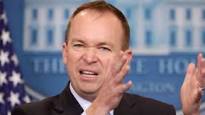How I Learned to Stop Worrying and Love OIRA
Legal Planet: Environmental Law and Policy 2019-07-16

If you’re like most environmentalists, you probably don’t have a high opinion of OIRA, the White House office that’s supposed to oversee regulations. (For those who are new to this, OIRA stands for the Office of Information and Regulatory Affairs.) The complaints are legion: that OIRA lacks transparency, that it acts as a back door for industry influence, that its role has never been authorized by Congress, and that its use of cost-benefit analysis tends to disfavor new regulations. Some would contest those critiques, but OIRA’s flaws pale in comparison to what’s happening now. The Trump Administration has managed to come up with a system that’s much worse than OIRA review, whether you’re an economist, an environmentalist, or both. Maybe even if you’re a libertarian, because it may backfire.
An article in yesterday’s Washington Post describes the new system. Mick Mulvaney, the Acting White House Chief of Staff, is an anti-regulatory zealot. He has helped install more than a dozen of his fellow ideologues in the White House in the months he’s been there. He and his crew run roughshod over mere cabinet members, who are told they are being judged on how quickly they can move with deregulation. “Based on interviews, Cabinet members are pressed weekly on what regulations they can strip from the books and have been told their performance will be judged on how many they remove. Policy and spending decisions are now made by the White House and dictated to Cabinet agencies, instead of vice versa.” The story seems to be especially well sourced.
On any dimension that you can think of, this process is worse than the way OIRA operates:
- Transparency. OIRA had limited transparency. This process has none at all.
- Expertise. OIRA’s professional staff may have less expertise than agencies. It has tended to weaken the role of agency expertise in the regulatory process. Mulvaney has no professional staff. Agency expertise — or any other kind — seems to have little role.
- Goals. OIRA applied a cost-benefit standard to limit new regulations. Mulvaney’s goal is simply to get rid of all existing regulations. Not a sound approach, from an economist’s perspective. Or an environmentalist one, obviously.
- Deliberation. OIRA tried to make sure agencies were thorough in responding to comments. Mulvaney wants to speed the process, at the expense of deliberation. That’s why this may not be so great from a libertarian point of view, because these rushed decisions may not stand up in court.
- Legitimacy. OIRA operated under an executive order and issued detailed public guidance about its standards and procedures. Mulvaney operates without either one.
- Appointment Process. The head of OIRA has to go through the Senate confirmation process, providing some legitimacy to the process. Mulvaney’s appointment was simply a matter of presidential fiat.
In other words, the regulatory process has been thrown out of the frying pan and into the fire. Welcome to the Trump era.